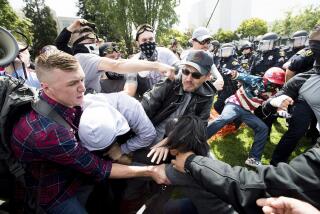Opinion: From antiwar armbands to American flag shirts
This week the U.S. Supreme Court refused to hear the appeal of some California high school students who were ordered to remove or hide shirts showing the American flag.
The students at Live Oak High School near San Jose wore Old Glory on May 5, 2010, during the observance of the Mexican holiday of Cinco de Mayo, and administrators feared that the flag would cause an altercation between white students and Mexican American students who viewed the flaunting of the flag as a hostile gesture. (In an editorial, the Los Angeles Times criticized the court for not taking the case.)
In seeking review of an appeals court decision against their clients, lawyers for the students — not surprisingly — cited a landmark 1969 case in which the court held that schoolchildren don’t “shed their constitutional rights to freedom of speech or expression at the schoolhouse gate.”
Tinker vs. Des Moines School District involved three Des Moines students who were suspended for wearing black armbands to school to protest the Vietnam War. John F. Tinker, 15, and Christopher Eckhardt, 16, were high school students. Mary Beth Tinker, John’s 13-year-old sister, was in junior high. The court ruled that their schools violated the teenagers’ free speech rights because the students weren’t disruptive and didn’t interfere with the rights of other students.
But there is an even closer connection between the Tinker case and the failed attempt to have the Supreme Court review the suppression of the American flag shirts. Mary Beth and John Tinker, who won their case 46 years ago, filed a brief with the court supporting the students at Live Oak High. (Eckhardt died in 2012.) The brief was written by lawyers including Eugene Volokh, a 1st Amendment scholar at UCLA.
As the brief explains, the Tinker siblings have made a lifelong commitment to the cause of freedom of speech for students:
“John Tinker is the general manager of KPIP, a low-power community FM radio station in Fayette, Mo. He is also the editor of Schema-Root.org, a Web-based encyclopedia of current events. Each year, he corresponds with dozens of students who are working on school projects related to Tinker vs. Des Moines, and several times each year, he speaks publicly in academic settings about the case.
“Mary Beth Tinker has also been active, and in 2013-14 participated in a nationwide campaign to promote student rights known as the ‘Tinker Tour.’ She traveled more than 25,000 miles by bus and spoke to more than 20,000 students and teachers at over 100 stops that included schools, colleges, churches, youth detention facilities, courts, and several national conventions. The armband she wore in 1965 is on permanent display at the Newseum in Washington, D.C.”
Perhaps the most important part of the Tinkers’ brief deals with the fact that even their protest met with threats and harassment — the factors that led the school officials at Live Oak High to ban the American flag shirts:
“One person telephoned the Tinkers’ home on Christmas Eve and said ‘the house would be blown up by morning.’ A woman called for Mary Beth, and when the young teen got on the line, said, ‘Is this Mary Beth? … I’m going to kill you.’ The Tinkers received other threatening telephone calls as well. They also received hate mail, and their house was vandalized with red paint.”
Finally, the Tinkers’ brief makes the point that there is continuity between their protest — arguably an expression of a “liberal” viewpoint — and the “conservative” patriotic gesture of the Live Oak students who wore the American flag. Free speech, in school and out of it, is not a liberal vs. conservative issue.
Follow Michael McGough on Twitter @MichaelMcGough3
More to Read
A cure for the common opinion
Get thought-provoking perspectives with our weekly newsletter.
You may occasionally receive promotional content from the Los Angeles Times.











